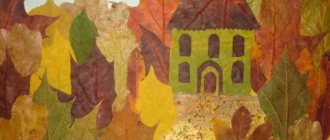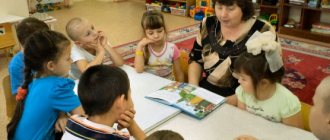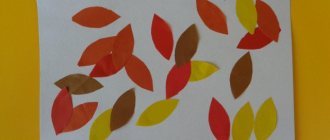Long-term planning for reading fiction in the preparatory group
Olga Kopylova
Long-term planning for reading fiction in the preparatory group
Month Title of the work Program tasks
September G. Sapgir “Counting books and tongue twisters”
.
Continue to develop an interest in fiction ; replenish literary baggage with poems and tongue twisters.
Reading and discussion of A. Barto’s poem “To School”
.
Continue to develop an interest in fiction ; replenish literary baggage with poems;
draw children's attention to expressive means. Cognitive – speech development. Acquaintance with an excerpt from A. S. Pushkin’s poem “Eugene Onegin”
“The sky was already breathing in autumn.”
.
Continue to develop an interest in fiction ; replenish literary baggage with poems;
Encourage children to be interested in the meaning of words. Cognitive – speech development. Reading and retelling of K. Ushinsky’s work “Four Wishes”
.
Continue to develop an interest in fiction ; develop the ability to meaningfully retell literary texts , practice intonation expressiveness of speech.
October Fairy tale by F. Salten “Bambi”
. Fragments.
Continue to develop an interest in fiction ; replenish your literary baggage with fairy tales ; to educate a reader capable of experiencing compassion and sympathy for the characters of the book.
M. Matusovsky’s poem “Where does the Motherland begin?”
Continue to develop interest in
artistic expression ; replenish the literary baggage with poetic works, instill sensitivity to the artistic word .
The story of M. Zoshchenko “Great Travelers”
.
Continue to develop an interest in fiction ; replenish your literary baggage with fairy tales ; educate the reader, develop a sense of humor in children, continue to introduce artists .
Reading a poem by D. Kharms “Very, very tasty pie”
.
Continue to develop interest in artistic expression ; replenish the literary baggage with poetic works, develop a sense of humor in children.
November-November Works of poets and writers of Russia. Reading and discussion of Yu. Vladimirov’s poem “Orchestre”
.
Continue to develop an interest in fiction ; replenish literary baggage with poems;
to educate a reader capable of experiencing compassion and empathy for the characters of the book. Russian folklore. Fable “Listen up, guys”
.
Continue to improve the artistic and speech performance skills of children when reading folk songs - fables;
continue to develop children's independence in organizing all types of games, following the rules and norms of behavior. Reading and discussion of P. Ershov’s fairy tale “The Little Humpbacked Horse”
.
Continue to develop an interest in fiction ; replenish your literary baggage with fairy tales ;
to educate a reader capable of experiencing compassion and sympathy for the characters of the book; ensure optimal physical activity throughout the day using physical exercise. Reading the prose work “Broken Wire”
E. Vorobyova.
Continue to develop an interest in fiction ;
to educate a reader capable of feeling compassion and empathy for the characters of the book; continue to develop children's independence in organizing all types of games, following rules and norms of behavior. December A holistic picture of the world, primary value ideas. Literary speech . Verbal art. “The Wolf and the Fox”
(arranged by I. Sokolov - Mikitov)
.
Create interest and need for reading ; replenish your literary baggage with fairy tales ; to educate a reader who is capable of feeling compassion and empathy for the characters of the book, to identify himself with his favorite character ;
develop a sense of humor in children. Reading and discussion of Yu. Koval’s story “Stozhok”
.
Develop an interest in fiction ; learn to retell a text, determine the character of the characters , convey individual episodes in person when retelling;
help understand the actions of the heroes; to educate a reader capable of feeling compassion and empathy for the characters of the book. Introduction to S. Krylov’s poem “The Winter’s Tale”
.
Continue to develop an interest in poetry, replenish the literary baggage with poetry , cultivate an interest in understanding nature through works of art .
Reading children's poems about the Christmas tree, New Year, Santa Claus, Snow Maiden. Continue to develop an interest in fiction ; replenish literary baggage with poems; to educate a reader capable of experiencing compassion and empathy for the characters of the book.
Jan-var Russian folklore. Reading and discussion of the epic “Dobrynya and the Serpent”
(retelling by N. Kolpakova)
.
To form an interest and need for reading , to replenish the literary baggage with epics ;
to educate a reader capable of experiencing compassion and empathy for the characters of the book. Reading and discussion of the fairy tale “Three Ears of Rye”
(a retelling of a Lithuanian folk tale)
.
Develop an interest in fiction ; learn to retell a text, determine the character of the characters , convey individual episodes in person when retelling;
help understand the actions of the heroes; to educate a reader capable of feeling compassion and empathy for the characters of the book. Reading and discussion of S. Yesenin’s poetic work “Birch”
.
Continue to develop interest in poetry, replenish your literary baggage with poetry ; to cultivate interest in understanding nature through artistic works .
Reading and discussion of the Russian folk tale “The Cockerel – the Golden Scallop and the Millstones”
.
Develop literary speech , introduce literary art, instill an interest in fiction ;
to educate a reader capable of experiencing compassion and empathy for the characters of the book. February Beauty and expressiveness of the language of the work. Poem by P. Voronko “There is no better native land”
(translated from Ukrainian by S. Marshak)
.
Develop interest in fiction , draw children's attention to the expressive means of language;
help to feel the beauty and expressiveness of the language of the work, instill sensitivity to the poetic word. Reading and discussion of the fairy tale by H. -K. Andersen's "The Ugly Duckling"
.
Develop an interest in fiction ; help to understand the actions of heroes, determine the characters ;
learn to retell a text, convey individual episodes in person when retelling; to educate a reader capable of experiencing compassion and empathy for the characters of the book. Russian folk tale "Vasilisa the Beautiful"
.
Continue acquaintance with Russian folk tales, learn to comprehend the characters ;
to form figurative speech, understanding figurative expressions, and develop creative abilities. Reading and discussion of the poem by R. Boyko “A soldier is walking down the street, medals are shining on him.”
.
Continue to develop an interest in fiction ; help to feel the beauty and expressiveness of the language of the work, instill sensitivity to the poetic word; expand ideas about the Russian army by reading poems on this topic.
March Fairy tale by H. -K. Anderson "Thumbelina"
.
Continue to develop an interest in fiction ; replenish your literary baggage with fairy tales ;
to educate a reader capable of experiencing compassion and sympathy for the characters of the book. Russian folklore. Song “Mother Spring is Coming”
.
Continue to improve artistic and speech performance skills when reading folklore songs ;
continue to develop children's independence in organizing all types of games, following rules and norms of behavior. Looking at story pictures. Introduction to verbal art. A. Prokofiev “Russian Birch”
.
Continue to develop an interest in fiction ; help to feel the beauty and expressiveness of the language of the work, instill sensitivity to the poetic word; replenish your literary baggage with poems.
Reading the poetic work of V. Zhukovsky “Lark”
(abbreviated)
.
Continue to improve the artistic and speech performance skills of children when reading a poetic work;
continue to develop children's independence in organizing all types of games, following rules and norms of behavior. April Fairy tale “White and Rosette”
, trans.
with him. L. Kona. Continue to develop an interest in fiction ; replenish your literary baggage with fairy tales ;
to educate a reader capable of experiencing compassion and sympathy for the characters of the book. Reading chapters : “Training”
,
“What you can see from the window
.
“Holiday”
- from
a literary work by V. Borozdin "Starships"
.
Conversation on reading. Continue to develop an interest in fiction ; to educate a reader who is able to feel compassion and empathy for the characters of the book, to identify himself with his favorite character ;
improve the ability to use different parts of speech in strict accordance with their purpose and the purpose of the statement; Help children master the expressive means of language. Looking at story pictures. Introduction to literary art . S. Alekseev “First night ta-ran”
.
Continue to develop an interest in fiction ; to educate a reader who is able to feel compassion and empathy for the characters of the book, to identify himself with his favorite character ;
ensure optimal physical activity throughout the day using physical exercises. Reading and discussion of a literary fairy tale by I. Sokolov-Mikitov “Salt of the Earth”
.
Continue to develop an interest in fiction ; draw children's attention to the expressive means of language (figurative words and expressions, epithets, comparisons)
; to educate a reader capable of experiencing compassion and empathy for the characters of the book.
May Literary fairy tale A. Remizov "Bread Voice"
.
Continue to develop an interest in fiction ; replenish your literary baggage with fairy tales ;
to educate a reader capable of experiencing compassion and sympathy for the characters of the book. Russian folklore. Fable “Listen up, guys”
.
Continue to improve the artistic and speech performance skills of children when reading folk songs - fables;
continue to develop children's independence in organizing all types of games, following the rules and norms of behavior. Reading and discussion of the fairy tale by A. Lindgren “The Princess Who Didn’t Want to Play with Dolls”
.
Continue to develop an interest in fiction ; replenish your literary baggage with fairy tales ;
to educate a reader capable of experiencing compassion and sympathy for the characters of the book; ensure optimal physical activity throughout the day using physical exercise. Reading the poetic work “Here comes the red summer.”
(Russian folk song)
.
Continue to improve the artistic and speech performance skills of children when reading a poetic work; continue to develop children's independence in organizing all types of games, following rules and norms of behavior.
MAGAZINE Preschooler.RF
Project to introduce preschoolers to fiction in the preparatory group “On the roads of fairy tales”Project leaders: Mukhamedyarova Gulnara Damirovna MADOU kindergarten No. 9 MR Uchalinsky district of the Republic of Belarus
Project type: informational, educational, creative.
Implementation dates: October 1-20, 2021
Project participants: children of the preparatory group, teachers, parents.
Problem: waning interest in fiction.
The goal of the project: to introduce children to highly artistic literature, to form a stock of artistic impressions in them, to instill an interest in theatrical activities, and to reveal the values of joint creativity between children and their parents.
Project objectives:
- Introduce different types of fairy tales, learn to recognize the characters of fairy tales, know the title and author, retell the content, express your attitude towards the heroes of the fairy tale; consolidate the ability to use means of expression (postures, gestures, facial expressions, movements) and different types of theaters (bibabo, finger theater, picture theater, puppet theater; improve the skills of independently choosing a fairy tale for staging, dramatization, preparing the necessary attributes and scenery for a future performance, distributing among themselves responsibilities and roles.
- To develop creative independence and aesthetic taste of preschoolers in the organization of theatrical games, in the creation and transmission of images, clarity of pronunciation, traditions of family reading.
- Nurture partnerships between children, communication skills, create a joyful emotional mood, and encourage creative initiative.
Relevance of the project:
A special place in preschool institutions is occupied by familiarization with literary literature.
A fiction book for a child is a powerful means of comprehensive education: it contributes to the development in children of love for the Motherland, for their native land, for their native nature, fosters love for their native language, awakens children’s imagination, and evokes children’s play.
Children's weak point in the creativity of children's writers; misunderstanding by parents of the importance of introducing children to fiction; insufficient development of emotions in children. Based on this, we chose this particular topic “On the roads of fairy tales” .
At today's stage in the life of modern society, this topic is very relevant.
Project stages:
Stages
| Name | Event | |
| 1 | Introductory |
|
| 2 | Preparatory |
|
| 3 | Decision-making |
|
| 4 | Performance |
|
| 5 6 | Performance assessment Final |
|
Project implementation
Types of joint activities
Cognitive and speech development:
- OOD: Coming up with riddles for fairy tales, memorizing folk tongue twisters, teasers, counting rhymes.
- Conversations: “Take care of the book” , “Why are books needed” , “Where do books live? ”
- Free communication: "What is theater" .
- Reading fiction - “Sivka the Burka” , “Dragonfly and the Ant” “Living Hat , “Grey Neck” , “The Little Humpbacked Horse” , The Frog Princess”, “The Tale of the Fisherman and the Fish” .
- Reading a Russian folk tale: “Ivan Tsarevich and the Gray Wolf” , “Sister Alyonushka and Brother Ivanushka” .
- Excursions to the city children's library.
- Composing creative stories “Write the end of a fairy tale” , “Write a fairy tale about...”
- “Literary minute” - before bed every day.
- Construction and modeling activity (Lego) “The Snow Queen's Castle” .
Social and communicative development:
- Plot-role-playing game: “Library” , “Bookstore” .
- Didactic games: “Name the author of the fairy tale” , “Guess the fairy tale” , “Whose costume” , “Which fairy tale is the hero from” , “Remember the words of the hero” .
- Game – dramatization: “Teremok” ; puppet theater "The Three Little Pigs" ; finger theater "Kolobok "
- Quiz: “Fairy tales are friends with children .
- Communication games: “Who is noticeable with what” , “Confusion” .
Artistic and aesthetic development:
OOD: Modeling “Character of a favorite fairy tale” , “Cat, rooster and fox” .
Application “The Frog Princess” .
Drawing . ”
Handmade (from natural materials) “Flower - seven-colored” .
- Listening to musical compositions from the cartoon “In the footsteps of the Bremen Town Musicians” .
- Looking at illustrations.
- Watching cartoons: “Twelve Months” , “Silver Hoof” , “The Steadfast Tin Soldier” .
Physical development:
- Outdoor games “Geese - swans” , “Wand - lifesaver” , “Wolf and lambs” .
- Physical exercises in special moments.
Working with parents:
- Exhibition of children's creativity, co-creation of children and parents:
- drawing competition “On the roads of fairy tales”
- exhibition of drawings and applications based on read fairy tales.
- Consultation for parents “Family and Books” .
Expected result:
Children should:
- show love for fairy tales and theatrical activities
- know and name the fairy-tale works read, their authors, texts, characters, morals.
- know different types of theaters and be able to show them
- be able to use various means of expression
- be able to independently choose a fairy tale, carry out preliminary work for its presentation, and get used to your role.
Used Books:
- E.S. Evdokimov “Design technology in preschool educational institutions” . M, shopping center Sfera, 2006
- L.D. Morozova “Project method in the activities of preschool educational institutions” , J. “Kindergarten from A to Z” . M., 2006 No. 2.
- S.V. Glebova "Kindergarten - family: aspects of interaction" . M, shopping center "Teacher" , 2007
- N.V. Elzhova "Ambulance for educators" , Phoenix, 2013.
- N.N. Gladysheva, Yu.B. Sergeantova, L.S. Bannova, L.V. Gribanova “Teacher’s work program: daily planning” , shopping center “Teacher” 2014.
- Internet resources: Social network of educators; maam. ru.
| < Previous | Next > |



